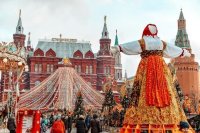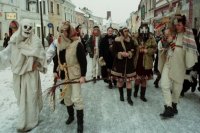
 Maslenitsa is one of the most famous and festive Slavic holidays, originating from pagan culture.
Maslenitsa is one of the most famous and festive Slavic holidays, originating from pagan culture.
This year, Maslenitsa celebrations will begin on Monday 11 March and end on Sunday 17 March. During this time, bright and noisy celebrations are held all across Russia: people ride sleds and horses, organize mass celebrations, bake the iconic pancakes with various tasty fillings, and have tea parties in a heart-warming family atmosphere. A variety of traditional workshops, delightful performances and concerts are held in the squares of Russian cities and villages.
Meanwhile, Slovakia is hosting its own equally picturesque festival – “fašiangy”, known in Russian as “meat feast” or even Maslenitsa. In this time of the year, Slovaks are having fun and are singing as they roam the streets of Slovak cities and villages, many even take days off at work to fully enjoy the celebrations. You may even come across the groups of people dressed in traditional masks of a bear, a horse, a goat and other animals. The main dishes on this celebration's menu are calorie packed foods like meats, donuts and pancakes. Even though the traditions of this holiday are the same throughout Slovakia, there are still subtle regional differences. For example, in the north of Slovakia there's a custom to cook huge number of fried eggs and invite over friends to enjoy the meal with. The ingredients for this dish are collected for a whole week by the mummers, who can hardly be refused.
Both Maslenitsa and Fašiangy holidays symbolize the beginning of spring and preparation for Lent. The traditions of this holiday allow the Slavic people to preserve their culture and not dissolve in the flow of foreign values.
Author: Samuel Malý


